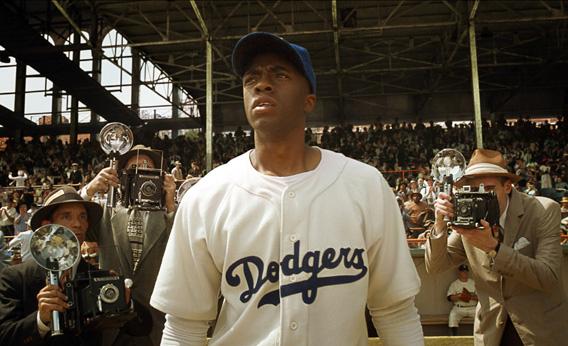
Chadwick Boseman as Jackie Robinson in 42
Photo courtesy of Warner Bros. Pictures
Brian Helgeland?s 42 is a smoothly paced, handsome, easily digestible biopic of baseball legend Jackie Robinson, the Brooklyn Dodger who in 1947 became the first black player to join the major leagues. It?s easy to imagine this movie being shown at a middle school during Black History Month, or even screened at the White House followed by a speech from the First Lady, as happened last week. If, like me, you don?t know much about Robinson?s life and career, you?ll learn a little, and if you know a lot, you may thrill to the re-enactment of some of his most famous and inspiring moments on the field. But I can?t help but feel that movies like 42 and The Help?reverent, squeaky-clean portraits of black heroes written and directed by whites?are exactly what middle school screenings and White House press events don?t need. By burnishing Jackie Robinson?s legend to such an unnaturally high polish, 42 does Robinson the man (and the actor who plays him, the relative newcomer Chadwick Boseman) a disservice.
In life, Robinson was a conflicted hero, proud of his role in baseball history but haunted for the rest of his life by the sense that he had been used by Dodgers owner Branch Rickey, here played by Harrison Ford, to further Rickey?s own reputation and bring attention and money to the team. There?s little trace of that complex relationship on view in 42, in which Rickey comes off as an almost entirely benevolent figure motivated less by publicity than by his own progressive beliefs. That?s not to say that Robinson?s relationship with Rickey couldn?t have contained multiple strands: benevolence and antagonism, gratitude and resentment. But there are very few parts of 42 that contain more than one strand of anything. White characters are either courageous champions of integration or N-word-shouting racists, and black characters?a circle that doesn?t extend far beyond Robinson, his wife (Nicole Beharie), and their friend the sportswriter Wendell Smith (Andre Holland)?are exemplars of stoicism, goodness, and pluck. Scene after scene pits more racially enlightened whites against less enlightened ones and has them shout it out, as Robinson stands silently by in the dugout, the field, or the front office. No doubt Robinson?s career did contain many such moments?but there also must have been times when the culture?s ambient racism expressed itself in subtler, more insidious ways, when Robinson and his family handled the pressures less than nobly, or simply when someone in the Brooklyn Dodgers organization or the Robinson household held a conversation about something besides racial prejudice.
Christopher Meloni does provide a few moments of levity as the Dodger?s grouchy, womanizing manager Leo Durocher, who?s eventually suspended for an extramarital affair and replaced by the softer-spoken Burt Shotton (Max Gail). John C. McGinley owns every scene he?s in as the dryly funny sportscaster Red Barber, who famously introduced Robinson in his first turn at the plate as ?very decidedly brunette.? And Harrison Ford, who at first seemed to be overacting, grew on me as the beetle-browed, growling Branch Rickey. It?s the most Wilford Brimley-esque role Ford has yet played?not an aging action hero but a straight-up, desk-bound old guy?and his performance, broad as it is, has a gruff emotional directness. A late scene where Rickey comforts Robinson after some particularly brutal on-field heckling, the two men awkwardly embracing in a stairwell near the dugout, was the only moment in the film that brought me anywhere near tears.
But that could be because there are so many moments in 42 that seek to evoke the viewer?s tears, often cued to the outsized swellings of Mark Isham?s symphonic score. Every athletic high or low point?the home runs, the strikeouts, the iconic moment in which fellow Dodger Pee Wee Reese defiantly stood by Robinson?s side as the jeering crowd shouted them down?is musically telegraphed before it happens, robbing the game scenes (of which there are many) of any suspense. Similarly, the portrait of Robinson?s home life is so hagiographic that it?s hard to get any handle on who either Jackie or Rachel Robinson are as people: Do they drink? Do they dance? Do they have sex? Do they fight? Boseman and Beharie both seem game for more than just a stiff, tableau-like re-enactment of the saints? lives, but they?re not given much else to work with?and as the selfless, backstoryless sportswriter helpmate who shows up periodically to shepherd them around while they?re on the road, poor Andre Holland might as well be wearing a pair of wings and holding a lyre.
I don?t mean to impugn the motives behind those who make films like 42: There?s no problem, in principle, with a white filmmaker making a movie about a black cultural hero, or vice versa. But if we?re going to have a conversation about race in America, I?d rather it revolve around the awkward, even offensive Brad Paisley/LL Cool J collaboration ?Accidental Racist? than around the sanitized pieties of a movie like 42, which tiptoes so reverently around its subject it leaves no room for accidents at all.
Source: http://feeds.slate.com/click.phdo?i=3706e2d17b54a7c27521fc633f918baa
the walking dead Walking Dead Season 3 smash Richard III Superbowl Commercials 2013 irs Grammy nominations 2013
No comments:
Post a Comment
Note: Only a member of this blog may post a comment.